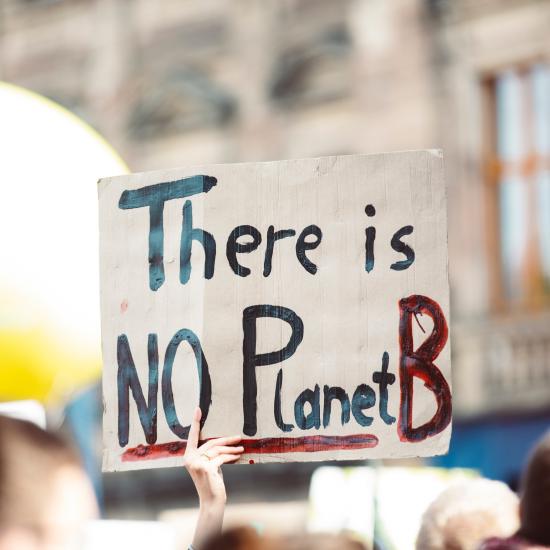Is your organisation ready for the challenge of collective negotiations to address the climate emergency?
Collective negotiation is one of the biggest challenges facing humanity as we try and tackle the climate emergency. This is not the multi-party negotiation that happens at each COP (whether it is COP27 when I first wrote this piece or COP28 that has just concluded in Dubai) but the day-to-day collective negotiation that flows from and beyond COP to achieve significant carbon reductions and even net positive outcomes as we face the reality of our fossil fuel economy.
This great transition will rely on effective negotiation processes that facilitate mutually beneficial solutions that support intergenerational, international, and intersectional sustainability and justice. The transformation of our economies requires cooperation and collaboration amongst key actors to ensure that the transition is fair, just and acceptable. It will mean inevitable losses to most parties based on their current mindsets and models of their interests and needs. Our high consumption economies are no longer viable for the future and will require significant changes in expectations about what is sufficient to lead a good life. Negotiation is about setting and managing expectations concerning mutually beneficial outcomes. It is about generating commitment to shared goals, building trust and setting in place sanctions if agreements are not being delivered.
This large-scale economic transition inevitably leads to social and political conflict. Unfortunately, it can also see the rise of simple answers to complex socio-ecological problems and the crises they produce. The rise of populism and empty slogans such as ‘make America great again’, harking back to some golden age totally detached from the socio-ecological crises we face, is just one example.
Common resource dilemmas
Central to the great transition required will be common resource dilemmas. By common resources, we mean the air, land, water and sea and the bio-diversity that is sustained and sustains these delicate eco-systems. The classic tragedy of the commons situation set out by the ecologist Garret Hardin, implies that stakeholders primarily tend to claim resources in a destructive way, prioritising short-term benefits which leads to the exploitation and long-term collapse of the resource. We have seen this played out in the oceans with fishing, in the forests with beef production and in multiple contexts where mono-cropping is destroying bio-diversity and soil quality (e.g. the growing dust bowls of the mid-west USA).
Hardin’s perspective has been characterised as the ‘comedy of the commons’ as it overlooks the practice of communities in managing common pool resources. In her research with indigenous communities Elinor Ostrom, a political economist, found sophisticated governance mechanisms to manage these resources. Collective negotiation is critical to establishing these mechanisms and agreeing sanctions for group members who ignore or transgress norms.
The cost-benefit analysis underpinning economic actors' decision-making often pays little or no attention to what economists call ‘externalities’ and what we now understand as pollution, bio-diversity loss, and a rapidly heating planet. These factors need to be integrated into all collective negotiations as large multi-national corporations (MNCs) seek to address their scope 1, 2 and 3 emissions.
The social science of negotiation in the last two decades or more has been influenced by cognitive and behavioural psychology. This deals with individual decision-making, prisoner's dilemmas and how our behaviour in negotiations is influenced by non-rational factors (loss-aversion, anchoring, face-saving and so on).
While these individual level phenomena are important to understand, our shared futures will be dependent on large-scale collective negotiations where group interests, conflicts and dilemmas will be played out.
With the likelihood of more social and political conflict, key economic actors will need to develop collective negotiating skills that can take account of multiple interests but most importantly build in the planetary voice. We are co-dependent on a sustainable planet for living. This is non-negotiable. This means addressing common resource dilemmas.

From distributive to integrative negotiation solutions
At the heart of collective negotiations is power. Large MNCs can drive meaningful change through their supply chains and as we have seen in the food sector, for example, this has led to producers seeking economies of scale to deliver food at the low prices buyers are prepared to pay. These scale economies have driven bio-diversity loss, mounting CO2 release and negative outcomes for consumers such as denatured food and obesity. It has also given us much cheaper food and an unrealistic expectation that food costs will always be a smaller part of our expenditures.
Lead firms in these sectors have seen negotiations in competitive, win-lose terms where they have power over smaller firms. These behaviours are driven by a distributive, fixed-pie mindset where one party’s gain is another party’s loss. In a world of rapid global warming, buyer-seller mindsets no longer serve these companies well. They may feed the beast of shareholder primacy and short-term profits but undermine efforts to build a sustainable planetary future for all.
The envelope needs to be enlarged and the voice of nature and stakeholders indirectly affected by firms behaviour represented.
The structural features of common resource dilemmas, from bio-diversity loss to social conflict and breakdowns, need to be integrated into collective negotiations. The envelope needs to be enlarged and the voice of nature and stakeholders indirectly affected by firms' behaviour represented. This may mean widening the stakeholders in collective negotiations to include social movement representatives, ecological movement actors and future generations through diverse youth representatives. This means structuring collective negotiations as integrative opportunities where intergenerational, intersectional, and international dimensions can be embraced.
Consequently, there is a much greater chance of not only developing mutually beneficial socio-ecological outcomes but minimising conflict and generating commitment to delivering on these agreements. Implementation is key and holding actors to account is likely to be more successful when the ‘system is in the negotiating room’.
The role of the Business School
Business schools can be seen to be part of the problem. Many got carried away by teaching that share-holder primacy is the core purpose of the firm – sadly, some still do. This perspective ignored ‘externalities’ and did not price in climate disaster to their firm profitability models. However, business schools can also be part of the solution. Negotiations is something we teach and can help and support actors in the development of the mindset shift needed to serve planet and people in this decisive decade. We can equip current and future leaders with the skills and abilities to take on these complex negotiating challenges. However, we do need more cases and examples of collective negotiation to deliver sustainable outcomes. We also need more research to understand the dynamics of successful collective multi-party negotiations in the context of delivering net zero commitments. And we need to build and support practitioner communities involved in these negotiations.
Dr Marc Thompson teaches negotiations on the Oxford EMBA and MBA programmes and is Academic Director of the Executive Masters in Change Leadership run jointly with HEC-Paris.




